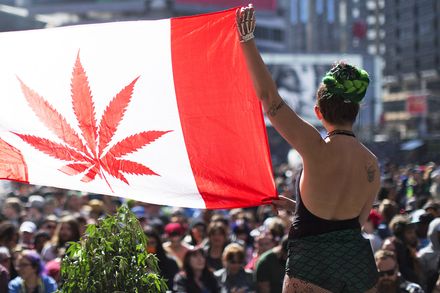7 cannabis experts make post-legalization predictions
After the legalization of cannabis in Canada, what does the future hold for Canada?
Recently, a panel of 7 cannabis experts looked through the haze to predict Canada’s post-legalization future.
For most Canadians, October 17 presents a new dawn. It’s the official date when cannabis consumption will be allowed across Canada. Although everyone seems to know October 17 as the date when cannabis will become legal in Canada, most people do not actually know what will happen after the historic day.
That’s why so many people have lots of questions in their minds as they think about the new regime when weed consumption is finally legalized across Canada.
Some of these questions are:
What happens to the cannabis black market? Will it die or will it thrive?
Will cannabis laws be fair?
How will Canada make the best of this economic opportunity?
These are just a few questions. There are many others that come to mind when we think of Canada’s socioeconomic experiment.
So, what do cannabis insiders think? Below, we hear from different cannabis consultants, lawyers, journalists and other professionals to get their predictions.
First is Deepak Anand, formerly of Canadian National Medical Marijuana Association and the current vice president in charge of government relations and business development at Cannabis Compliance Inc.
Other experts include: David Malmo-Levine, the founder of PotFacts who is also a well-known cannabis educator and agitator, David Kretzmann, a financial analyst at the Motley Fool Canada with a bias on cannabis stock, and Trina Fraser, leader of Canna Law Group. Others are Ricardo Baca, founder of the Cannabis and Grasslands, Jack Lloyd, a cannabis lawyer and Jamie Shaw of Groundwork Consulting.
So, what obstacles can we expect to meet in the six months following cannabis legalization?
According to Trina Fraser of the Canna Law Group, cannabis legalization in Canada has the hallmarks of becoming a success right from day one.
Fraser says that a legal weed market is way better than an unregulated black market.
“Overall, it will be a learning curve for Canada and I expect that the taxing and regulatory framework will adjust along the way,” says Fraser.
Her sentiments are shared by Riccardo Baca, a marijuana reporter. He says the rollout won’t be a disaster in any way.
“Canada and its provinces will make their own mistakes and miscalculations, but I don’t think its something that can be remotely classified as disastrous.”
Although the rollout seems like it will be a smooth sail, not everyone agrees that the journey will have no obstacles.
According to David Kretzmann, a financial analyst at the Motley Fool Canada, there will be stumbles at the first stages, especially when it comes to distribution and retail.
With such obstacles, most consumers will have to choose either the cannabis retail market or the black market as their most convenient route. Jamie Shaw of Groundwork Consulting sees the rollout descending into nothing else but chaos.
“As we start the roll out, there will be many other pressing issues to be discussed, including edibles legislation, the medical program and legalization itself.” He says that most people think that the rollout will be characterised by one rough year, but the truth of the matter is cannabis legalization will continue to be a pressing issue for the next decade or so.
For Jack Lloyd, nothing beats the fact that cannabis will be in stores legally, and that consenting adults can grow and share it like tomatoes. “How cool is that?”, he quips.
With legalization, there’s the likelihood of cannabis shortages. Will that affect consumers in any way?
“There will be a shortage of cannabis from October through to January, but not beyond that,” says Anand.
Other experts posit that the rollout will be a trial and error experiment as stakeholders are likely to take time to get the right mix of the product or to even understand the needs of the consumer.
“Expect prices to go up on every front. However, after a few months, expect the market to right itself,” says Baca.
On his part, Shaw says that the Canadian weed industry will be met with increased provincial and international pressure as producers continue to grow at scale.
“New international markets are opening, with a bias for exports,” he adds.
Canada stands at a vantage point in its economic history. There’s no escaping the fact that it’s the first fully industrialised nation to legalize cannabis, but questions arise as to whether the country will be in a position to take advantage of the first-to-market advantage that it has.
According to Kretzmann, Canada needs to enable weed companies to develop new products, invest in research and build brands. He argues that if Canada rests on its laurels as far as legal cannabis is concerned, cannabis companies from elsewhere, including the US, could take advantage of the progress made by Canadian firms.
Lloyd thinks that what’s happening in Canada is a redistribution of the cannabis recreational market.
“It could result in severe economic problems for parts of Canada that rely on the black market to supplement local economies,” he adds.
Baca believes that the rollout will result in bolstered budgets for educating children and adults about substance abuse. “In the end, we are hopeful of seeing heightened funding for roads, parks, and public buildings.”
Not everyone agrees that Canada could actually take advantage of this. “Although Canada is in a unique position, its current advertising regulations will hamper the growth of the Canadian brands. In case the US legalizes weed, it could blast right past Canada.”
With legalization of weed in Canada, what happens to its rampant black market?
Longtime cannabis educator Malmo-Levine sees resistance coming from the organized black market activists. In the same light, some experts see a thorough crackdown on illegal weed merchants.
“Authorities will definitely clamp down on credit card providers, Canada Post, and other carriers to help in seizing and shutting down these illegal outlets,” says Anand. Citing Bill C-45 and C-46, he says that authorities have ample tools to enforce the laws by first dealing with illegal operators.
Fraser seems to share the same opinion. “We expect a systematic crackdown on illegal dispensaries.”
While government crackdown on illegal traders seems imminent, its restrictive policies could do little to curb the black market.
According to Kretzmann, any government that has restrictive policies provides just the right environment for the black market to thrive.
Shaw sees more medically minded players continuing with their civil disobedience to give patients the products they need.
But Lloyd’s forecast is rather positive. “I hope to see these illegal businesses becoming licensed players. The market needs them.”
As with any other historical legislation, the Canadian cannabis law is expected to have some hitches of its own. Our experts weigh in on the likely missteps that Canadian authorities could be making in the early stages of legalization.
“First of all, there are a number of things that the federal and provincial governments could have changed but they didn’t. We expect to see lots of litigation from a human rights perspective and courts will need to resolve these arising issues,” says Anand.
Lloyd thinks the cannabis law presents some life-threatening consequences if some of its aspects are not challenged right away. “Impaired driving is one of these,” he says.
According to Kretzmann, the biggest missteps arise from the Canadian authorities are stuck to past dogma about weed.
“If you look at early proposals, you’ll see that weed will be under strict regulations and scrutiny, more than alcohol. Yet, evidence suggests that alcohol is more dangerous.”
Fraser says that some provinces, like Manitoba and Quebec, could change their position on homegrowns sooner than later, most likely due to a legal challenge or politics. Malmo-Levine’s prediction is that the media will grossly downplay infringements.
“Consumer inconvenience is just but a distraction from the human rights violations happening post-cannabist prohibition,” he says.
His sentiments are echoed by Shaw, who says that the biggest issues now revolve around consumer rights. “Without better cannabis labelling, we are setting consumers up for bad experiences that could have been avoided. They need to educate themselves about different strains and their effects.”
With every passing day, we inch closer to the historic October 17 date when weed officially becomes legal across Canada. What will you be doing on October 17?
Most people, especially the cannabis community, will be out celebrating with friends, probably lighting up joints and soaking in the merry that comes with the freedom to consume cannabis.
It seems some of our cannabis experts won’t be left our in the merry-making.
“I’ll be celebrating at Parliament Hill that day,” says Fraser.
Baca tells us he’ll be in Canada and would most likely be celebrating with clients or reporting from the front line.
As for Lloyd and Malmo-Levine, they hope to spend their day in court, defending a client for using of growing cannabis.

